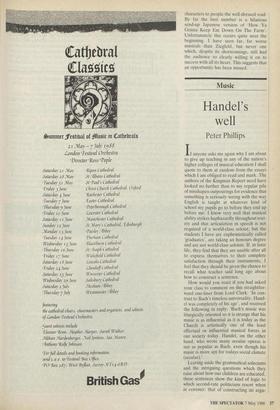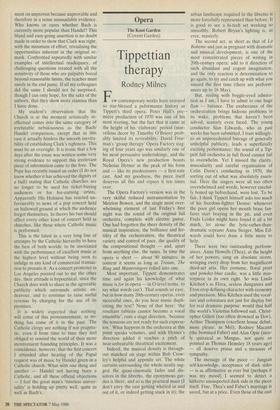Music
Handel's well
Peter Phillips
If anyone asks me again why I am about to give up teaching in any of the nation's higher colleges of musical education I shall quote to them at random from the essays which I am obliged to read and mark. The authors of the Kingman Report need have looked no further than to my regular pile of misshapen outpourings for evidence that something is seriously wrong with the way English is taught at whatever kind of school my pupils go to before they end up before me. I know very well that musical ability strikes haphazardly throughout soci- ety and that articulation in speech is not required of a world-class soloist; but the students I have are euphemistically called 'graduates', are taking an honours degree and are not world-class soloists. If, in later life, they find that they are unable after all to express themselves to their complete satisfaction through their instruments, I feel that they should be given the chance to recall what teacher said long ago about how to construct a sentence.
How would you react if you had asked your class to comment on this straightfor- ward one-liner from Lord Clark: 'In con- trast to Bach's timeless universality. Hand- el was completely of his age', and received the following in reply: `Bach's music was liturgically oriented so it is strange that his music is as influential as it is today as the Church is artistically one of the least effectual or influential musical forces in our society today. Handel, on the other hand, who wrote many secular operas is not as popular as Bach, even though his music is more apt for todays social climate (secular).'
Leaving aside the grammatical solecisms and the intriguing questions which they raise about how our children are educated, these sentences show the kind of logic to which second-rate politicians resort when in extremis: that of constructing an argu-
ment on unproven because unprovable and therefore in a sense unassailable evidence. Who knows or cares whether Bach is currently more popular than Handel? This bland and easy-going assertion is no doubt made in order to show that Clark was right, with the minimum of effort, trivialising the opportunities inherent in the original re- mark. Confronted repeatedly with similar examples of intellectual inadequacy, of challenging questions treated with all the sensitivity of those who are palpably bored beyond reasonable limits, the teacher must surely in the end panic. If all my colleagues did the same I should not be surprised, though I can only hope, for the sake of the unborn, that they show more stamina than I have done.
My student's observation that the Church is at the moment artistically in- effectual comes into the same category of irrefutable nebulousness as the Bach/ Handel comparison, except that in this case it actually hinders the smooth inevita- bility of establishing Clark's rightness. This must be an oversight. It is ironic that a few days after the essay was written some very strong evidence to support this irrelevant piece of information came to the fore. The Pope has recently issued an order (I do not know whether it has achieved the dignity of a bull) stating that Catholic churches are no longer to be used for ticket-buying audiences or for fee-earning artists. Apparently His Holiness has reacted un- favourably to news of a pop concert held on hallowed ground at which the audience forgot themselves. In theory his ban should affect every other kind of concert held in churches, like those where Catholic music is performed.
This is the latest in a very long line of attempts by the Catholic hierarchy to have the best of both worlds: to be associated with the performance of excellent music at the highest level without being seen to indulge in any kind of commercial transac- tion to procure it. As a concert promoter in Los Angeles pointed out to me the other day, their attitude is hypocritical, since the Church does wish to share in the agreeable publicity which surrounds artistic en- deavour, and to continue to raise useful revenue by charging for the use of its premises.
It is widely expected that nothing will come of this pronouncement, as no- thing has come of it in the past. The Catholic clergy are nothing if not pragma- tic, even if from time to time they feel obliged to remind the world of their more inconvenient founding principles. It was a coincidence, however, that the first concert I attended after hearing of the Papal request was of music by Handel given in a Catholic church. What with one thing and another — Handel not having been a Catholic, and all these official objections — I feel the great man's 'timeless univer- sality' is holding up pretty well, quite as well as Bach's.























































 Previous page
Previous page